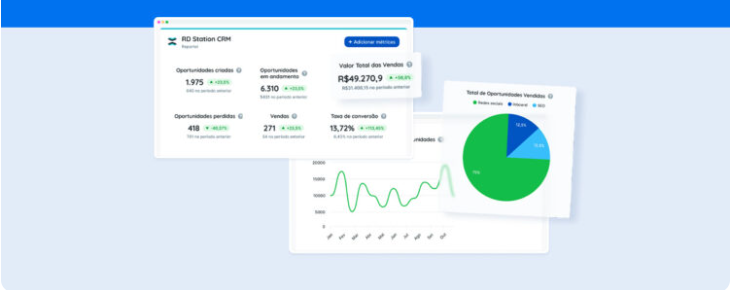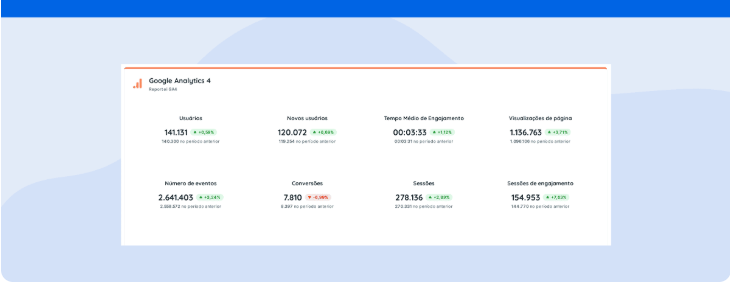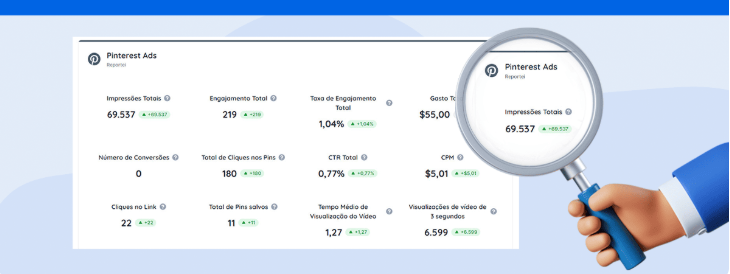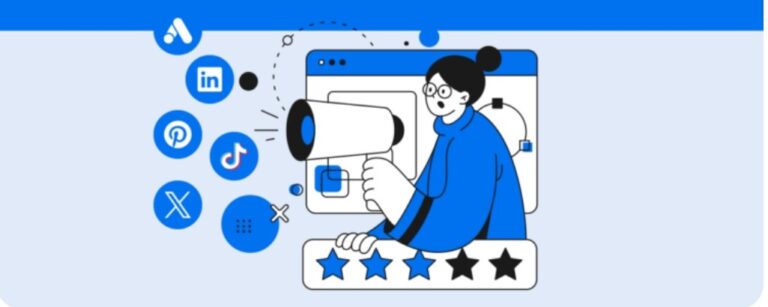Discover what a CRM dashboard is and how this tool can make your sales analyses more efficient and accurate in daily routines.
Having a CRM dashboard has become essential for companies that need to manage contacts, track sales opportunities, and extract strategic insights more efficiently and accurately.
That’s why we prepared this article to present not only what a CRM dashboard is but also to show the 7 main benefits of using it in your analyses. Check it out below.
What is a CRM dashboard
To begin with, it’s crucial to understand what a CRM dashboard means and why it is so relevant to the success of any business.
CRM stands for Customer Relationship Management represents the set of strategies, processes, and technologies focused on managing and analyzing interactions with your clients from the first contact to post-sale.
Thus, within this context, the CRM dashboard acts as a visual interface that consolidates all indispensable information for tracking the sales funnel in one place..
Through charts, tables, and key performance indicators (KPIs) it is possible to make quicker and informed decisions, monitor results in real-time, and identify areas for improvement in the sales process.
In essence, this resource offers clarity and practicality in data analysis which optimizes the planning and execution of strategies to boost sales and strengthen customer relationships.
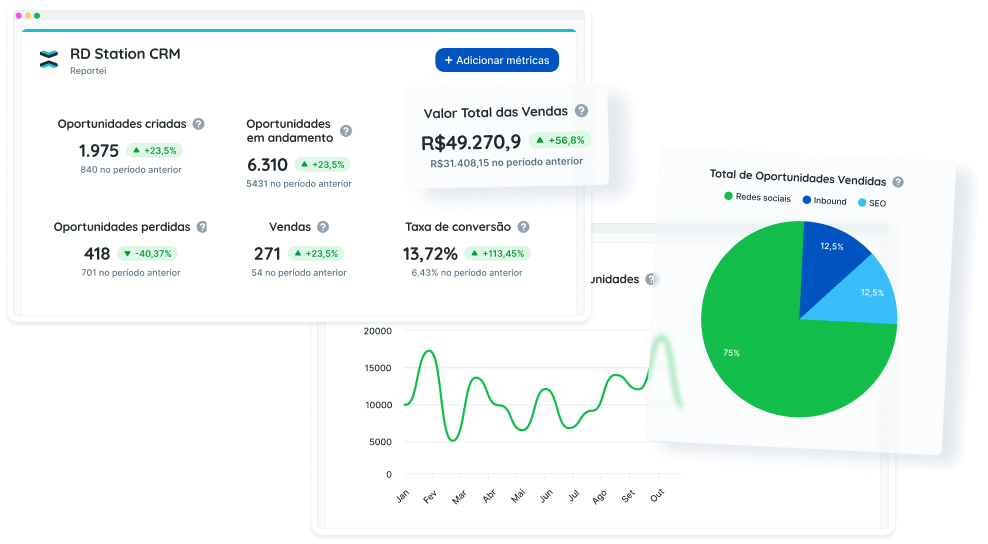
7 main benefits of using a CRM dashboard
Now that you know what a CRM dashboard is and how it works, it’s worth checking how its features translate into practical benefits. Let’s go.
1. Panoramic view of the sales funnel
Undoubtedly, one of the biggest challenges faced by companies is having clarity on how each business opportunity is progressing within the sales funnel.
But with a CRM dashboard, it’s possible to get a panoramic view of which stage each lead is at, which contacts need to be prioritized, and which negotiations require more attention to be concluded.
Besides optimizing the sales team’s time, this monitoring also increases the chances of closing new deals.
2. Agility in decision-making
The speed with which information reaches the decision-maker makes all the difference in the success of a commercial strategy.
In this sense, the CRM with dashboard offers real-time updated data and ensures that leadership immediately identifies changes in consumer behavior or team performance.
With these data at hand, it is possible to adjust targets, reallocate resources, or even create specific campaigns for prospects at a certain stage of the funnel.
3. Improvement in team management
Managing a sales team requires tracking tasks, targets, and individual results.
To do this more efficiently, a dashboard helps monitor, in just a few clicks, how many leads each salesperson manages, how many opportunities were converted in the month, and what the success rate per professional is.
From these indicators, it is possible to discover each collaborator’s strengths and weaknesses, as well as enabling the development of training and actions aimed at improving collective performance.
4. Identification of key metrics in the CRM dashboard
For commercial management to be successful, it is essential to define and track KPIs relevant to the business.
Thus, the CRM dashboard simplifies this task, as it concentrates metrics like lead conversion rate, sales volume, average deal value, and average negotiation time.
Having these metrics accessible makes it easier to assess the effectiveness of actions and direct efforts towards what truly brings results.
5. Consolidation of data from multiple sources
Nowadays, it’s common for companies to use various platforms and communication channels to engage with customers, such as social media, websites, email marketing, paid advertising, among others.
Gathering this data in one place can be a laborious task, but a good CRM dashboard can eliminate this problem.
After all, it integrates information from different sources to provide a holistic view of performance, allowing the sales and marketing team to identify important correlations or gaps in the results.
6. Historical data analysis
In addition to observing the current scenario, the dashboard can also be used to record and organize past data, so the team can navigate them with agility and precision.
This way, it can analyze performance over time, making it easier to identify patterns and trends that directly influence the commercial strategy.
Moreover, this history is fundamental for future planning as it allows predicting seasonal variations or changes in customer buying behavior.
Thus, decisions are more informed and less susceptible to perception errors.
7. Customization for different needs
Each company and each sales team has unique needs.
For this reason, working with a flexible panel that can be tailored to specific goals and preferences, is extremely valuable.
Thus, it’s possible to create a CRM dashboard template adapted to each business area, displaying only the most relevant metrics and reports.
This customization allows each team member to focus on what is truly essential for their daily tasks.
Meet the CRM dashboards of Reportei
Now that you’ve understood the 7 main benefits of a CRM dashboard, it’s time to meet a platform that takes this strategy to another level, Reportei.
Specialized in consolidating data from various sources in one place, the tool integrates with CRMs like Hubspot Sales, RD Station CRM, and Pipedrive, to offer an even more robust solution.
So, the CRM dashboards of Reportei offer advantages such as:
- Real-time data visualization to monitor results instantly without waiting for lengthy reports or generating manual spreadsheets. This way, you can make quicker decisions and avoid reworks in the sales routine.
- Customization and segmentation allows creating customized panels focused on metrics and information that truly matter to the business, as well as segmenting data according to each team’s needs.
- Historical data analysis Reportei stores your data over time, facilitating trend analysis and the planning of future strategies. This way, it is simpler to identify periods of high or low performance and adjust actions accordingly.
- Identification of key metrics from ready-made templates or customized dashboards you can display the most relevant indicators for your strategy. Moreover, these informations are presented clearly and objectively, making performance analysis more efficient.
- Consolidation of data from multiple sources gathers information from different marketing and sales platforms to create a unified view of performance, helping to correlate data and find valuable insights.
That is, by choosing Reportei as your CRM partner, you not only get a robust dashboard but also gain practicality when creating reports and sharing results with the team or with your clients.
Try a free 3-day trial now and see for yourself how the platform can transform the way you manage your business information.
